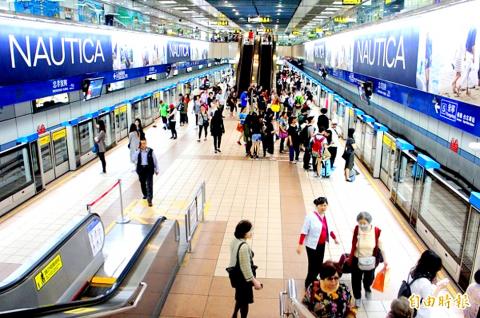As Taipei’s Mass Rapid Transit (MRT) system has been losing money every year, Taipei Rapid Transit Corp (TRTC) yesterday said that it plans to cancel a 20 percent discount for using electronic payment cards to pay fares.
The company informed the Taipei City Council’s Transportation Committee of the plan at a morning meeting.
Passengers who use an EasyCard or other electronic payment cards on the MRT system with an electronic payment card receive a 20 percent discount on each ride.

Photo: Lin Chia-yu, Taipei Times
However, while the system’s passenger volume has exceeded 2 million rides per day, TRTC said that it has run a deficit every year since the system’s inception 23 years ago, losing up to NT$100 million (US$3.2 million) annually over the past few years.
Operating revenue is in the negative again this year, with the deficit totaling more than NT$40 million in the first four months of the year, and the company expects to lose up to NT$130 million by the end of the year, TRTC general manager Yen Pang-chieh (顏邦傑) said.
Nonoperating revenue streams have compensated for the deficit in operating revenue, but the ticket discount policy must be reconsidered, he said.
While Chinese Nationalist Party (KMT) Taipei City Councilor William Hsu (徐弘庭) said that canceling the discount would lead to increased costs for passengers, Yen said that TRTC is considering giving greater discounts to people who take the MRT more frequently.
“It is an unreasonable marketing strategy to give tourists or people who hardly ride the MRT a 20 percent discount, while those who use it more often should receive a bigger discount,” he said, adding that the “loyalty discount” plan is being evaluated and would be submitted to the city government for approval before the end of the year.

CHIPMAKING INVESTMENT: J.W. Kuo told legislators that Department of Investment Review approval would be needed were Washington to seek a TSMC board seat Minister of Economic Affairs J.W. Kuo (郭智輝) yesterday said he received information about a possible US government investment in Taiwan Semiconductor Manufacturing Co (TSMC, 台積電) and an assessment of the possible effect on the firm requires further discussion. If the US were to invest in TSMC, the plan would need to be reviewed by the Department of Investment Review, Kuo told reporters ahead of a hearing of the legislature’s Economics Committee. Kuo’s remarks came after US Secretary of Commerce Howard Lutnick on Tuesday said that the US government is looking into the federal government taking equity stakes in computer chip manufacturers that

NORTHERN STRIKE: Taiwanese military personnel have been training ‘in strategic and tactical battle operations’ in Michigan, a former US diplomat said More than 500 Taiwanese troops participated in this year’s Northern Strike military exercise held at Lake Michigan by the US, a Pentagon-run news outlet reported yesterday. The Michigan National Guard-sponsored drill involved 7,500 military personnel from 36 nations and territories around the world, the Stars and Stripes said. This year’s edition of Northern Strike, which concluded on Sunday, simulated a war in the Indo-Pacific region in a departure from its traditional European focus, it said. The change indicated a greater shift in the US armed forces’ attention to a potential conflict in Asia, it added. Citing a briefing by a Michigan National Guard senior

POWER PLANT POLL: The TPP said the number of ‘yes’ votes showed that the energy policy should be corrected, and the KMT said the result was a win for the people’s voice The government does not rule out advanced nuclear energy generation if it meets the government’s three prerequisites, President William Lai (賴清德) said last night after the number of votes in favor of restarting a nuclear power plant outnumbered the “no” votes in a referendum yesterday. The referendum failed to pass, despite getting more “yes” votes, as the Referendum Act (公民投票法) states that the vote would only pass if the votes in favor account for more than one-fourth of the total number of eligible voters and outnumber the opposing votes. Yesterday’s referendum question was: “Do you agree that the Ma-anshan Nuclear Power Plant

ENHANCED SECURITY: A Japanese report said that the MOU is about the sharing of information on foreign nationals entering Japan from Taiwan in the event of an emergency The Ministry of Foreign Affairs yesterday confirmed that Taiwan and Japan had signed an agreement to promote information exchanges and cooperation on border management, although it did not disclose more details on the pact. Ministry spokesman Hsiao Kuang-wei (蕭光偉) said the ministry is happy to see that the two nations continue to enhance cooperation on immigration control, in particular because Taiwan and Japan “share a deep friendship and frequent people-to-people exchanges.” “Last year, more than 7.32 million visits were made between the two countries, making it even more crucial for both sides to work closer on immigration and border control,” he said. Hsiao